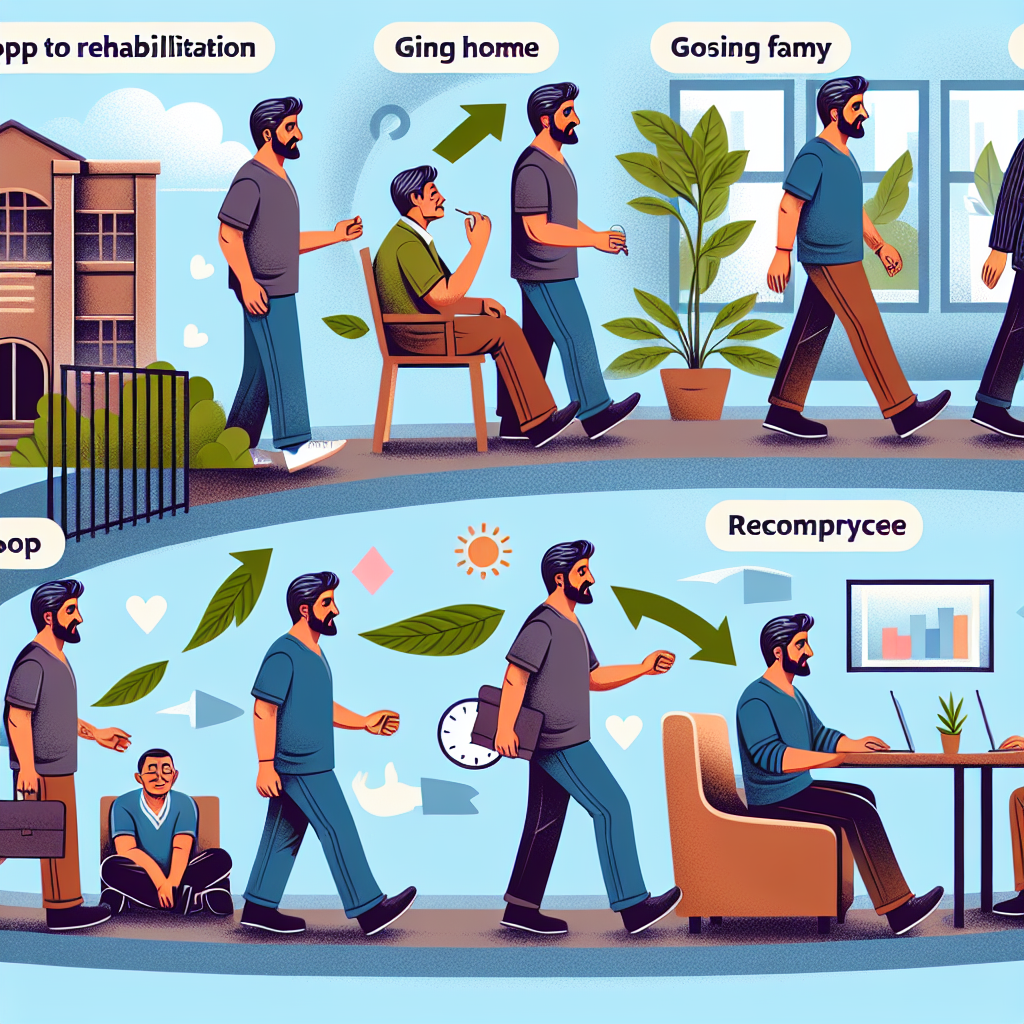-
Table of Contents
Introduction

Supporting a loved one on their path to recovery can be a challenging yet profoundly rewarding experience. Recovery, whether from addiction, mental health issues, or a significant life setback, requires a compassionate and understanding approach. This guide aims to provide practical advice and emotional support strategies to help you assist your loved one effectively. By fostering a supportive environment, encouraging healthy habits, and maintaining open communication, you can play a crucial role in their journey towards healing and resilience. Understanding the complexities of recovery and being equipped with the right tools can make a significant difference in their progress and overall well-being.
Understanding the Stages of Recovery
Understanding the stages of recovery is crucial when supporting a loved one on their path to healing. Recovery is not a linear journey; it is a complex process that involves various stages, each with its own set of challenges and triumphs. By familiarizing yourself with these stages, you can provide the appropriate support and encouragement that your loved one needs at each step of their journey.
The first stage of recovery is often marked by a sense of crisis or realization. This is the point where the individual acknowledges that they have a problem and that change is necessary. It can be a time of intense emotions, including fear, shame, and confusion. During this stage, it is essential to offer a non-judgmental and compassionate presence. Listening without interrupting and validating their feelings can help them feel understood and less isolated. Encouraging them to seek professional help, such as therapy or support groups, can also be beneficial.
As your loved one moves into the contemplation stage, they begin to weigh the pros and cons of their situation and consider the possibility of change. This stage can be marked by ambivalence and uncertainty. It is important to be patient and avoid pushing them too hard, as this can lead to resistance. Instead, gently encourage them to explore their feelings and thoughts about recovery. Sharing stories of others who have successfully navigated similar challenges can provide inspiration and hope.
The preparation stage follows, where the individual starts to make concrete plans for change. This is a time of setting goals and developing a strategy for recovery. Your role during this stage is to offer practical support and encouragement. Help them identify resources, such as treatment programs or support networks, and assist with logistical arrangements if needed. Celebrating small milestones and acknowledging their efforts can boost their confidence and motivation.
When your loved one enters the action stage, they begin to implement their recovery plan. This stage involves significant behavioral changes and can be both physically and emotionally demanding. Providing consistent support and encouragement is crucial. Offer to accompany them to appointments or meetings, and be a source of positive reinforcement. It is also important to respect their autonomy and allow them to take ownership of their recovery process.
The maintenance stage is where the individual works to sustain the changes they have made and prevent relapse. This stage can last for months or even years, and it requires ongoing effort and vigilance. Continue to offer your support by being a reliable and understanding presence. Encourage them to stay connected with their support networks and to engage in healthy activities that promote well-being. Remind them that setbacks are a natural part of the recovery process and that they should not be discouraged by them.
Finally, the termination stage is reached when the individual no longer feels threatened by their past behaviors and has fully integrated their new, healthier lifestyle. While this stage signifies a significant achievement, it is important to recognize that recovery is a lifelong journey. Continue to celebrate their progress and be there for them as they navigate the ongoing challenges of life.
In conclusion, understanding the stages of recovery allows you to provide the most effective support to your loved one. By being patient, compassionate, and encouraging, you can help them navigate their path to recovery with greater confidence and resilience. Remember that your support can make a profound difference in their journey towards healing and a healthier, more fulfilling life.
Providing Emotional Support and Encouragement
Supporting a loved one on their path to recovery can be both a challenging and rewarding experience. It requires patience, understanding, and a deep well of compassion. One of the most crucial aspects of this journey is providing emotional support and encouragement, which can significantly impact their progress and overall well-being. To begin with, it is essential to create a safe and non-judgmental environment where your loved one feels comfortable expressing their thoughts and emotions. This involves active listening, where you not only hear their words but also understand the feelings behind them. By showing empathy and validating their experiences, you can help them feel less isolated and more understood.
Transitioning from listening to offering encouragement, it is important to recognize and celebrate small victories along the way. Recovery is often a long and arduous process, and acknowledging even the smallest achievements can boost their morale and motivation. Simple words of affirmation, such as “I’m proud of you” or “You’re doing great,” can go a long way in reinforcing their efforts and fostering a positive mindset. Additionally, setting realistic and attainable goals together can provide a sense of direction and purpose, making the journey feel more manageable.
Moreover, it is vital to educate yourself about their specific condition or struggle. Understanding the challenges they face can help you offer more informed and effective support. This might involve reading books, attending support groups, or consulting with professionals. By gaining knowledge, you can better empathize with their situation and provide practical advice when needed. However, it is equally important to respect their autonomy and avoid imposing your own solutions. Instead, encourage them to take an active role in their recovery, empowering them to make decisions and take control of their own journey.
In addition to emotional support, fostering a healthy and supportive environment is crucial. This might involve helping them establish a routine, encouraging healthy habits such as regular exercise and balanced nutrition, and minimizing stressors that could hinder their progress. Being a consistent and reliable presence in their life can provide a sense of stability and security, which is often essential for recovery. Furthermore, it is important to be patient and understanding, recognizing that setbacks are a natural part of the process. Offering reassurance and reminding them that it is okay to have bad days can help them stay resilient and focused on their long-term goals.
Transitioning to the importance of self-care, it is essential to remember that supporting a loved one can be emotionally taxing. Taking care of your own mental and emotional well-being is crucial to being an effective support system. This might involve seeking your own support network, engaging in activities that bring you joy, and setting boundaries to prevent burnout. By maintaining your own health, you can be a more present and positive influence in your loved one’s recovery journey.
Lastly, fostering open and honest communication is key. Encourage your loved one to share their feelings and experiences without fear of judgment. Being transparent about your own feelings and concerns can also strengthen your relationship and build mutual trust. By working together and maintaining a strong, supportive connection, you can help your loved one navigate the challenges of recovery and move towards a healthier, more fulfilling life. Through empathy, encouragement, and unwavering support, you can play a pivotal role in their journey to recovery, inspiring hope and resilience along the way.
Creating a Safe and Supportive Environment
Creating a safe and supportive environment is crucial when helping a loved one on their path to recovery. The journey to recovery can be fraught with challenges, and having a nurturing space can make a significant difference in their progress. To begin with, it is essential to foster open communication. Encouraging your loved one to express their feelings and thoughts without fear of judgment can help them feel understood and valued. Active listening, where you genuinely pay attention and respond empathetically, can build trust and make them more comfortable sharing their struggles.
In addition to open communication, establishing a routine can provide a sense of stability and predictability. Consistent daily activities, such as regular meal times, exercise, and sleep schedules, can create a structured environment that promotes mental and physical well-being. This routine can serve as a foundation upon which your loved one can build their recovery efforts. Moreover, involving them in the planning process can give them a sense of control and responsibility, which is often empowering.
Another critical aspect is creating a physical space that feels safe and comforting. This might involve decluttering their living area, ensuring it is well-lit, and incorporating elements that bring them joy, such as plants, artwork, or soothing colors. A clean and organized environment can reduce stress and make it easier for them to focus on their recovery goals. Additionally, consider removing any potential triggers or harmful substances that could hinder their progress.
Emotional support is equally important. Offering encouragement and celebrating small victories can boost their morale and motivation. It is vital to acknowledge their efforts and progress, no matter how minor they may seem. Positive reinforcement can help them stay committed to their recovery journey. Furthermore, being patient and understanding during setbacks is crucial. Recovery is rarely a linear process, and there will be ups and downs. Showing compassion and refraining from criticism during difficult times can help them feel supported rather than discouraged.
Involving professional help can also be beneficial. Encouraging your loved one to seek therapy or counseling can provide them with additional tools and strategies to cope with their challenges. Support groups can offer a sense of community and shared experiences, which can be incredibly comforting. It is important to respect their autonomy and allow them to make decisions about their treatment while offering gentle guidance and support.
Moreover, educating yourself about their condition can enhance your ability to provide effective support. Understanding the nature of their struggles and the recovery process can help you empathize with their experiences and offer informed assistance. This knowledge can also dispel any misconceptions and reduce frustration on both sides.
Lastly, taking care of yourself is essential. Supporting a loved one through recovery can be emotionally taxing, and it is important to maintain your well-being. Ensuring you have your own support system, engaging in self-care activities, and setting boundaries can prevent burnout and enable you to be a more effective support person.
In conclusion, creating a safe and supportive environment involves a combination of open communication, routine, a comforting physical space, emotional support, professional help, education, and self-care. By fostering these elements, you can significantly contribute to your loved one’s recovery journey, helping them feel valued, understood, and empowered to overcome their challenges.
Encouraging Healthy Lifestyle Choices
Supporting a loved one on their path to recovery can be a challenging yet profoundly rewarding experience. Encouraging healthy lifestyle choices is a crucial aspect of this journey, as it can significantly impact their overall well-being and long-term success. To begin with, it is essential to understand that recovery is a holistic process, encompassing physical, emotional, and mental health. Therefore, fostering an environment that promotes balanced living can make a substantial difference.
One of the first steps in encouraging healthy lifestyle choices is to lead by example. Demonstrating your commitment to a healthy lifestyle can inspire your loved one to follow suit. This might involve adopting nutritious eating habits, engaging in regular physical activity, and prioritizing self-care. By sharing these experiences, you create a supportive atmosphere that emphasizes the importance of health and wellness.
In addition to modeling healthy behaviors, it is vital to provide emotional support. Recovery can be an arduous journey, often fraught with setbacks and challenges. Offering a listening ear and a compassionate heart can help your loved one feel understood and valued. Encouraging open communication allows them to express their feelings and concerns, which can alleviate some of the emotional burdens they may be carrying. Furthermore, celebrating their achievements, no matter how small, can boost their confidence and motivation to continue making positive changes.
Another critical aspect of encouraging healthy lifestyle choices is to educate yourself and your loved one about the benefits of a balanced diet. Proper nutrition plays a significant role in physical and mental health, and understanding this connection can be empowering. Collaborate on meal planning and preparation, focusing on whole foods rich in essential nutrients. This not only ensures that they receive the nourishment they need but also fosters a sense of togetherness and shared purpose.
Physical activity is another cornerstone of a healthy lifestyle. Regular exercise can improve mood, reduce stress, and enhance overall physical health. Encouraging your loved one to find an activity they enjoy can make it easier for them to incorporate exercise into their daily routine. Whether it’s a morning walk, a yoga class, or a dance session, the key is to make it enjoyable and sustainable. Participating in these activities together can also strengthen your bond and provide additional motivation.
Moreover, it is crucial to emphasize the importance of mental health in the recovery process. Encouraging practices such as mindfulness, meditation, and journaling can help your loved one manage stress and develop a more positive outlook. Additionally, seeking professional support from therapists or counselors can provide valuable guidance and coping strategies. By normalizing the conversation around mental health, you help create a safe space for your loved one to address their emotional needs.
Lastly, fostering a sense of community and connection can be incredibly beneficial. Encourage your loved one to engage in social activities and build relationships with others who share similar goals. Support groups, community events, and volunteer opportunities can provide a sense of belonging and purpose, which are essential components of a fulfilling life.
In conclusion, helping a loved one on their path to recovery involves a multifaceted approach that prioritizes healthy lifestyle choices. By leading by example, providing emotional support, focusing on nutrition, promoting physical activity, emphasizing mental health, and fostering community connections, you can create a nurturing environment that empowers your loved one to thrive. Remember, your unwavering support and encouragement can make all the difference in their journey toward a healthier, happier life.
Conclusion
Supporting a loved one on their path to recovery involves several key steps: educating yourself about their condition, offering emotional support, encouraging professional help, setting healthy boundaries, and practicing patience. It’s crucial to listen without judgment, provide a stable environment, and celebrate small victories. By being a consistent source of encouragement and understanding, you can significantly contribute to their journey towards healing and well-being.



